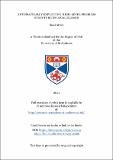Files in this item
Automatically exploiting high-level problem structure in local-search
Item metadata
| dc.contributor.advisor | Jefferson, Christopher Anthony | |
| dc.contributor.advisor | Miguel, Ian | |
| dc.contributor.author | Attieh, Saad | |
| dc.coverage.spatial | viii, 163 p. | en_US |
| dc.date.accessioned | 2022-11-01T14:38:49Z | |
| dc.date.available | 2022-11-01T14:38:49Z | |
| dc.date.issued | 2021-11-30 | |
| dc.identifier.uri | https://hdl.handle.net/10023/26286 | |
| dc.description.abstract | Constraint Programming is the study of modelling and solving complex combinatorial problems. Systematic-search and local-search are both well-researched approaches to solving constraint problems. Systematic-search exhaustively explores the entire search space and can be used to guarantee optimality, prove infeasibility or enumerate all possible solutions. Conversely, local-search is a heuristic-based approach to solving constraint problems. Often used in industrial applications, local-search is used to discover high-quality solutions quickly, usually sacrificing the ability to cover the entire search space. For this reason, it is preferred in applications where the scale of the problems being solved are beyond what can be feasibly searched using systematic methods. This work investigates methods of using information derived from high-level specifications of problems to augment the performance and scalability of local-search systems. Typically, abstract high-level constraint specifications or models are refined into lowlevel representations suitable for input to a constraint solver, erasing any knowledge of the specifications' high-level structures. We propose that whilst these lower-level models are equivalent in their description of the problems being solved, the original high-level specification, if retained, can be used to augment both the performance and scalability of local-search systems. In doing this, two approaches have been implemented and benchmarked. In the first approach, Structured Neighbourhood Search (SNS), a systematic solver is adapted to support declarative large neighbourhood search, using the high-level types such as sets, sequences and partitions in the original problem specification to automatically construct higher-quality, structured neighbourhoods. Our experiments demonstrate the performance of SNS when applied to structured problems. In the second approach, a novel constraint-based local-search solver is designed to operate on the high-level structures without refining these structures into lower-level representations. The new solver Athanor can directly instantiate and operate on the types in the Essence abstract specification language, supporting arbitrarily nested types such as sets of partitions, multi-sets of sequences and so on. Athanor retains the performance of SNS but boasts a unique benefit; on some classes of problems, the high-level solver is shown to be able to efficiently operate on instances that are too large for low-level solvers to even begin search. | en_US |
| dc.language.iso | en | en_US |
| dc.publisher | University of St Andrews | |
| dc.subject.lcc | QA76.612A88 | |
| dc.subject.lcsh | Constraint programming | en |
| dc.subject.lcsh | Search theory | en |
| dc.title | Automatically exploiting high-level problem structure in local-search | en_US |
| dc.type | Thesis | en_US |
| dc.type.qualificationlevel | Doctoral | en_US |
| dc.type.qualificationname | PhD Doctor of Philosophy | en_US |
| dc.publisher.institution | The University of St Andrews | en_US |
| dc.identifier.doi | https://doi.org/10.17630/sta/215 |
This item appears in the following Collection(s)
Items in the St Andrews Research Repository are protected by copyright, with all rights reserved, unless otherwise indicated.

